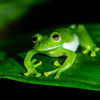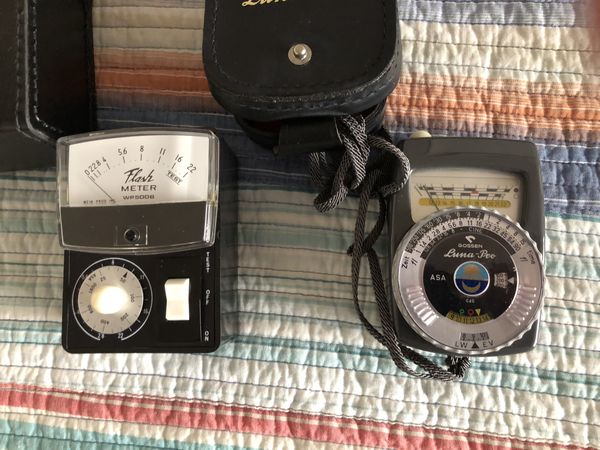Light Meters?
Nov 27, 2020 10:34:14 #
Kozan
Loc: Trenton Tennessee
Scruples wrote:
Dear All: I would like to purchase a Light Meter? However, I have seen some meters over $100 and up to $2000. That seems like a large price differential. I might buy a light meter but don’t want to break the bank. Does anyone have a suggestion on a particular manufacturer and model number?
I've always used the Minolta Auto Meter IV F. It is now produced by Kenko model 1100 Profesional.
Since it does Flash and ambient light, it is all I would ever need. Adorama has them for $248.
Nov 27, 2020 10:41:24 #
"A light meter for what? Your digital camera is plenty qualified as a meter for photography." I cannot agree more.
"If you use multiple flash they sure come in handy." I also agree with this statement. If using studio light or off camera flash without TTL surely a meter with flash capabilities is a must.
Spot meter is something that comes handy when using an all manual camera without a meter. In camera spot meter vary the angle of view depending on the lens in use. A one degree spot meter is very accurate but requires experience on the part of the operator.
Modern cameras are excellent tools and their built in meters are an asset.
"If you use multiple flash they sure come in handy." I also agree with this statement. If using studio light or off camera flash without TTL surely a meter with flash capabilities is a must.
Spot meter is something that comes handy when using an all manual camera without a meter. In camera spot meter vary the angle of view depending on the lens in use. A one degree spot meter is very accurate but requires experience on the part of the operator.
Modern cameras are excellent tools and their built in meters are an asset.
Nov 27, 2020 11:15:45 #
camerapapi wrote:
"A light meter for what? Your digital camera ... (show quote)
A light meter to measure light. Not necessarily for photography.
Nov 27, 2020 11:49:34 #
I'm with E.L. on this entirely. The one the Sekonic he recommends is the one I use most of the time. I've used one of these for over 10 years.
Prior to that, and I still use it from time to time is an S.E.I. Photometer. https://www.uglyhedgehog.com/t-113454-1.html
Oddly enough, I purchased my Sekonic from a friend who sold it to me at a great price. He said he was going digital and wouldn't need anymore. Within 6 weeks he was inquiring if I'd like to sell it back to him. He had to purchase a new one.
--Bob
Prior to that, and I still use it from time to time is an S.E.I. Photometer. https://www.uglyhedgehog.com/t-113454-1.html
Oddly enough, I purchased my Sekonic from a friend who sold it to me at a great price. He said he was going digital and wouldn't need anymore. Within 6 weeks he was inquiring if I'd like to sell it back to him. He had to purchase a new one.
--Bob
E.L.. Shapiro wrote:
I use Sekonic meters. I have had several models ov... (show quote)
Nov 27, 2020 12:41:33 #
Based on your criteria, I recommend to install an app on your smart phone, assuming you use a smart phone. It's inexpensive (free or a nominal cost) works very well and has lots of options. The app I use is MylightMeter in the app store. I use it on my iPhon and assume it is available on other phones. At least that will get you started inexpensively.
Nov 27, 2020 12:47:33 #
CHG_CANON wrote:
A light meter for what? Your digital camera is plenty qualified as a meter for photography.
My Nikon F, Bronica S and Yoshika don't have meters. Are you suggesting I carry a DSLR along to use as a light meter? Kind of bulky compared to my LunaPro.
Nov 27, 2020 13:08:57 #
Nov 27, 2020 13:24:58 #
billnikon
Loc: Pennsylvania/Ohio/Florida/Maui/Oregon/Vermont
Scruples wrote:
Dear All: I would like to purchase a Light Meter? However, I have seen some meters over $100 and up to $2000. That seems like a large price differential. I might buy a light meter but don’t want to break the bank. Does anyone have a suggestion on a particular manufacturer and model number?
I like a incident light meter because it reads the light reaching it, I find it more accurate than a meter that reads reflected light.
But, that said, why not get an incident, reflected, and flash meter all in one, better yet, this one reads flash and light for beautiful fill flash outside or inside. So, this meter is actually three meters in one, and very accurate.
Here you go, it will be the last light meter you own.
https://www.bhphotovideo.com/c/product/1390250-REG/sekonic_401_305_l_308x_u_flashmate_light_meter.html
Nov 27, 2020 14:21:04 #
Nov 27, 2020 14:47:38 #
GoofyNewfie wrote:
My favorite meter of all time is the Minolta Autom... (show quote)
I could not agree more, especially for film work, which a few relics like myself still do, but I use the IVF for both mediums. I also have the Minolta Color meter which is a real handy little sucker and saves screwing around with white balance in post, which is never as accurate as getting it the first time. And for film it is indispensable. Take a reading, a filter or two if necessary and shoot. And it is more accurate in mixed ambient light. The IVF is a lot more convenient to use then aiming for exact measurements with the camera, as it can calculate an average exposure for Incident and reflected light and give you a value, and you can adjust your exposure for whichever of the two you wish to emphasize, or just use the average. Try doing that with a camera meter. And they are very reasonably priced these days. If you want to nail it, you need the right hammer, and the Minolta will do it, on the cheap.
Nov 27, 2020 15:10:03 #
Exposure meters! Like everything else we discuss and argue about on UHH, some folk love 'em, some folk hate 'em, some don't even know what they are or what they do and others don't care! All good!
If however, you are interested in film or digital photography and go in for a touch of nostalgia, the Sekonic L-398A is a good and economical choice for you. It's an updated CLASSIC based on the old Norwood/Director line of the olden-days. I purchased the original model when I was in high school, took it to Viet Nam, used it for many years thereafter, and swapped it up for the more current model, at the time, the Cds version. It's really a cool instrument. It has the traditional incident light collector hemispheric dome, a reflected light grid, and a great flat disk type incident light insert that is great for measuring individual ligh sources for determining lighting ratios. There are slide-in grids for direct f/stop analog readings. The head swivels. Cheap- New about $250 street price. Used- average 50 bucks! They are available at popular camera shops and eBay.
If you learn to use and interpret the calculator dial, it is a LESSON in the exposure triangle, dynamic range and latitude in films. Speaking of which- if you can score a good used Weston meter the dial is also an education in sensitometry and exposure control and manipulation- a godsend for zone system addicts.
Just like cameras and other photographic stuff, exposure meters require skill for the best results. I often compare photographic equipment to musical instruments. If you have the money, you can purchase a Stratovarius violin, however, if you don't know how to play it, it will sound like a cavorting tomcat in the night! A $1,700 Spectra model, of major cinemaphotography production fame, would not do you any good unless you know precisely how to aim and operate it.
Many shooters actually buy a meter and don't know how, never learned, or too lazy to use it properly- they aim it randomly, get lousy results and blame the meter. The trick is where and how to sample light and most of that knowledge is simple enough and usually included I the user's manual. Some folks will experience the same disappointment withte the built-in camera's meter system by selecting the wrong menu choice to simply sample light from the wrong place.
If you do buy an analog meter, the neckstrap is an important accessory. They don't take well to dropping on the floor or impact. The meter movement in an analog meter is far more fragile than the liquid crystal or LED readouts on electronic/digital models.
If however, you are interested in film or digital photography and go in for a touch of nostalgia, the Sekonic L-398A is a good and economical choice for you. It's an updated CLASSIC based on the old Norwood/Director line of the olden-days. I purchased the original model when I was in high school, took it to Viet Nam, used it for many years thereafter, and swapped it up for the more current model, at the time, the Cds version. It's really a cool instrument. It has the traditional incident light collector hemispheric dome, a reflected light grid, and a great flat disk type incident light insert that is great for measuring individual ligh sources for determining lighting ratios. There are slide-in grids for direct f/stop analog readings. The head swivels. Cheap- New about $250 street price. Used- average 50 bucks! They are available at popular camera shops and eBay.
If you learn to use and interpret the calculator dial, it is a LESSON in the exposure triangle, dynamic range and latitude in films. Speaking of which- if you can score a good used Weston meter the dial is also an education in sensitometry and exposure control and manipulation- a godsend for zone system addicts.
Just like cameras and other photographic stuff, exposure meters require skill for the best results. I often compare photographic equipment to musical instruments. If you have the money, you can purchase a Stratovarius violin, however, if you don't know how to play it, it will sound like a cavorting tomcat in the night! A $1,700 Spectra model, of major cinemaphotography production fame, would not do you any good unless you know precisely how to aim and operate it.
Many shooters actually buy a meter and don't know how, never learned, or too lazy to use it properly- they aim it randomly, get lousy results and blame the meter. The trick is where and how to sample light and most of that knowledge is simple enough and usually included I the user's manual. Some folks will experience the same disappointment withte the built-in camera's meter system by selecting the wrong menu choice to simply sample light from the wrong place.
If you do buy an analog meter, the neckstrap is an important accessory. They don't take well to dropping on the floor or impact. The meter movement in an analog meter is far more fragile than the liquid crystal or LED readouts on electronic/digital models.
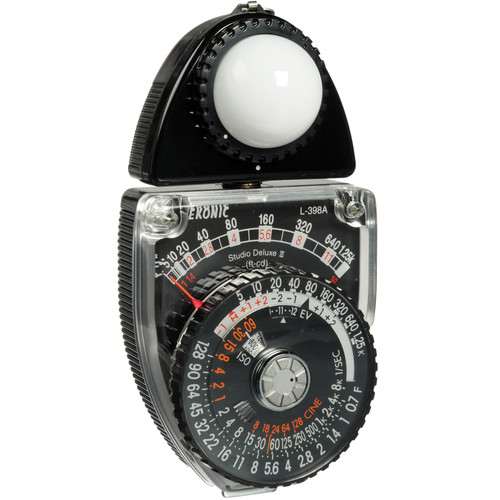
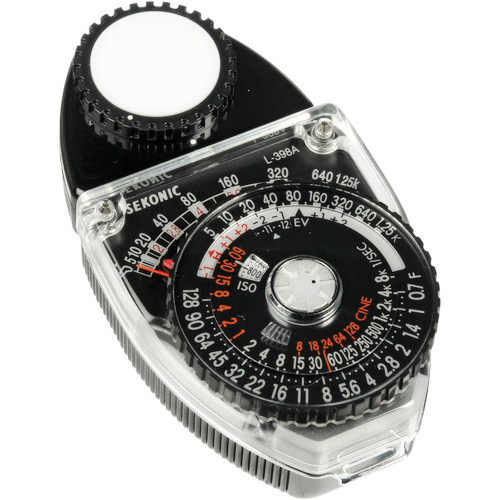
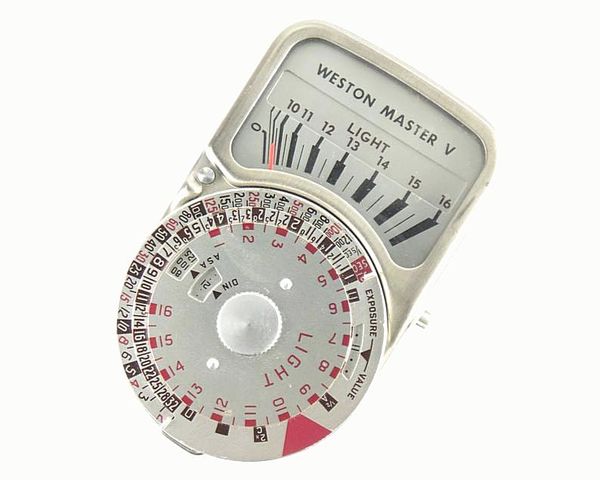
Nov 27, 2020 15:56:09 #
Wyantry
Loc: SW Colorado
Scruples wrote:
Dear All: I would like to purchase a Light Meter? However, I have seen some meters over $100 and up to $2000. That seems like a large price differential. I might buy a light meter but don’t want to break the bank. Does anyone have a suggestion on a particular manufacturer and model number?
It was not clear if you want a meter for photography or if you want to measure light intensity.
You might want to check EBAY for “light intensity meter”. There are several that may serve your purposes.
Nov 27, 2020 16:20:14 #
I have carefully stored these for 20 years, but I believe they are still fine.They need a new home with someone who has a use for them. $100 for both.
Nov 27, 2020 16:52:17 #
Check out Polaris I have used one in the studio for flash setups and outside you can choose reflective or incident. One meter does it well without breaking the bank.
Nov 27, 2020 17:13:49 #
Wyantry wrote:
It was not clear if you want a meter for photography or if you want to measure light intensity.
It's clear enough to those who read what the original poster wrote.
If you want to reply, then register here. Registration is free and your account is created instantly, so you can post right away.



